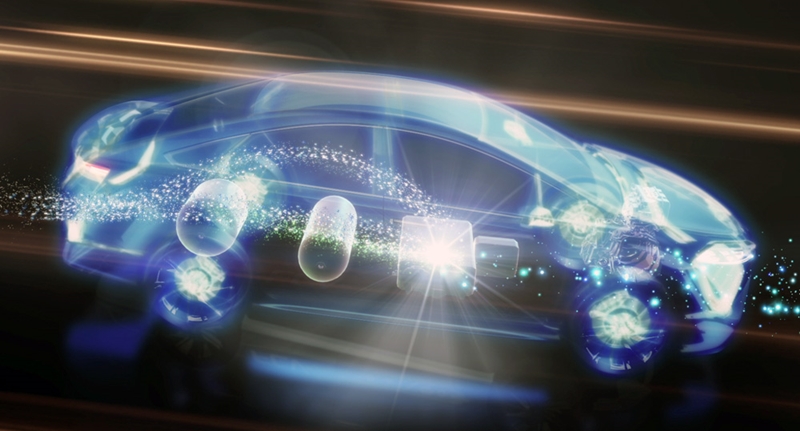Youâ€
Wrong. Well, unless youâ€
No ad to show here.
What exactly is a hydrogen fuel cell car? Exactly as the name suggests: a car that uses fuel cells to convert hydrogen into electricity (by reacting it with oxygen from the atmosphere), which it then employs to power the wheels. And, rather importantly, it emits nothing more harmful than a little heat and water in the process.
Of course, that very fact – that tailpipe emissions are non-existent – is probably the hydrogen fuel cell carâ€
Hydrogen itself — the very first entry on the periodic table — is the most abundant element in the universe, so it makes oodles of sense as a fuel source. But harvesting its potential isn’t exactly simple, and bespectacled boffins have been battling with this conundrum for decades. Even today, there are a number of obstacles still standing belligerently in the fuel cell carâ€
But in the meantime, here are the seven biggest issues the hydrogen fuel cell car will have to overcome in order to successfully “go mainstreamâ€.
1. Cost
Ah, yes. Money. Always top of the list, it seems. Currently — even after extensive advances in the relevant technology — hydrogen fuel cells are exceedingly expensive to produce. Why? Well, partly because fuel cells make use of platinum (although manufacturers are starting to reduce their dependency of this costly precious metal) and partly due to economies of scale. Until FCVs are produced on a mass scale, theyâ€
2. Infrastructure
Of course, related to cost is infrastructure. Since fuel cell vehicles canâ€
3. Extraction
Hydrogen may be abundant, but unfortunately not in the form required by FCVs. In fact, it doesnâ€
4. Storage
Hydrogen is a strange creature. It possesses high energy for its weight, but low energy for its volume. Thus, most automakers are opting to compress hydrogen gas in sealed tanks, which are then stored on-board FCVs. Thing is, these tanks tend to be heavy (the enemy of efficiency and ultimately range), impractically large and expensive. Then thereâ€
5. Durability and reliability
Generally, hydrogen fuel cells arenâ€
6. Safety
Unfairly or not, hydrogen gained quite a reputation as long ago as 1937, when the German passenger airship Hindenburg went up in flames. Compared to petrol, hydrogen requires only about ten percent as much energy to ignite, and when it does, the resulting flames are close to invisible (making a hydrogen fire pretty damn hard to fight). There are, of course, concerns about leakage from or rupture of sealed tanks on board a FCV in the event of a crash – although the same can be said of petrol. However, one thing in favour of leaked hydrogen gas is that its composition would see it quickly move upwards from the ground, potentially taking any pesky fireballs with it.
7. Perception
Hydrogen fuel cell cars have long been touted as the future of the automobile. But, for a variety of reasons, the public has been kept waiting for an absolute age – which of course led to a general feeling of scepticism and a lack of acceptance. Add to that the all-important cost factor and other concerns raised above, and it becomes rather challenging to convince the typical motorist that a FCV is a realistic alternative to a petrol or diesel motorcar. But all is not lost: FCVs still have a dedicated following – with many people viewing them as a better long-term solution than hybrid or full-electric vehicles – and automakers will be working hard to grow this positive perception.
